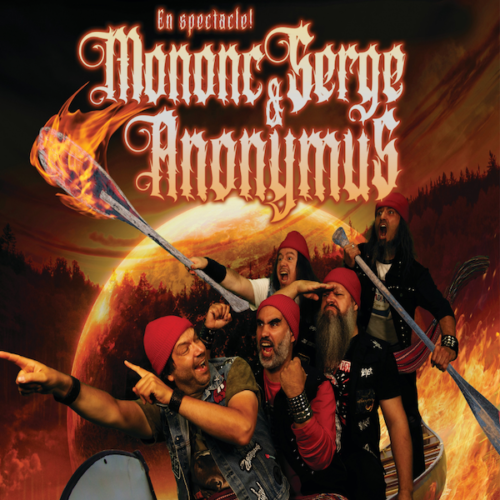After 16 years since Musique Barbare, was it still allowed to hope that one of the most explosive collaborations in francophone music would make a comeback on record? A handful of live performances by Anonymus and Mononc’ Serge may have hinted at it in recent years. On Métal canadien-français, the band delivers everything we could have hoped for in a third album.
Scathing, absurd, mocking, sarcastic lyrics to be taken in the first, second and even third degrees… that’s the central element of this record. But when you give Serge Robert’s rhymes an ear, you have to know what boat you’re in. This time, it’s in the canoe of The Bewitched Canoe legend. The idea was ripe for exploitation: an ode to all those who grew up both in Quebec and with metal and its adjacent genres. It covers all sorts of things familiar to the average Quebec metalhead: growing old with extreme music, tribute bands, hockey violence, the keb’ accent, the contradictions between the sugar shack and Iron Maiden, and so on. But there are also more universal themes, such as the futility of playing music in the age of artificial intelligence, the catharsis of violent video games and the mirage of cocaine. Mononc Serge’s ability to unearth new sources of inspiration is still astonishing, even after fifteen albums.
Back in 2003, when L’académie du massacre was released, the quintet mostly recycled pre-existing Mononc’ Serge songs in Anonymus’ heavy, distorted style. Apart from a few original pieces like “L’âge de bière,” which stood out, it was really with the second opus, five years later, that the compositions were taken to a higher level, with certain tracks standing out independently of their lyrics. On Métal canadien-français, this is still the case, although some tracks would certainly fall flat without the Mononc’ Serge supporting them. Among the batch of standout tracks are “La bataille du Vendredi saint”, “Hommage aux hommages” and “J’parle vrai”, which are sophisticated enough to stand up as thrash metal hits. This more than makes up for a few unremarkable choruses and the hackneyed “Shitty Accent,” whose chord progression is essentially a modulation of the classic “Ogunquit”.
All things considered, Métal canadien-français remains a niche product designed to appeal to French-speaking and Francophile metalheads here and, to a lesser extent, in Europe. Part music, part comedy, this album is a welcome gift of sharp irony and self-deprecation to lighten our souls.
























